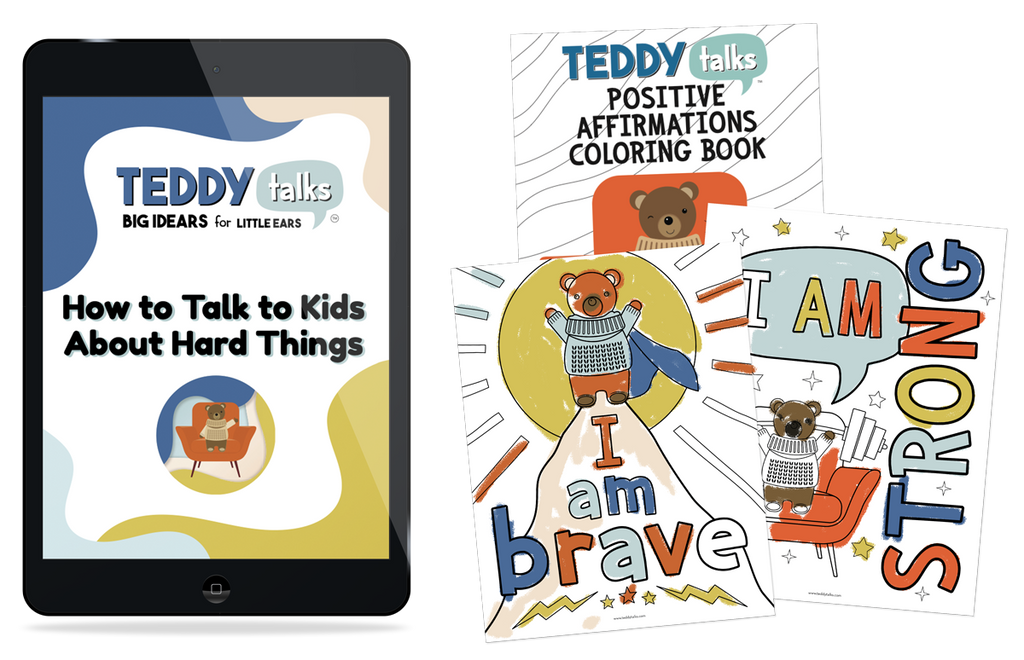
By a show of hands, how many wish they could bubble wrap their child?
Yea, all of us. That’s what I thought.
There is nothing more painful as a parent than witnessing your child struggle or hurt. In an attempt to protect, we sometimes think that avoiding certain topics serves as a shield, but, often, quite the opposite is true. According to the CDC, 30% of children have anxiety, and 80% will never get help.
An ode to the late Mr. Fred Rogers who said, “Anything that's human is mentionable, and anything that is mentionable can be more manageable. When we can talk about our feelings, they become less overwhelming, less upsetting, and less scary.”
I never fully understood this until becoming a mother myself. It is tricky telling your toddler that his favorite stuffy is missing an arm thanks to the family pup or that you accidentally ran over her bike with your car (oops!). What I have learned, though, is that these hard conversations were stepping stones, preparing me for much bigger conversations like racism, peer pressure, bullying, death, a pandemic, and more.
Our discomfort can leave us somewhat like deer in headlights. We don’t know what to say, and the self-inflicted pressure to say the “right” thing can leave us feeling paralyzed. But, we don’t have to be perfect to be effective or supportive. In fact, our immobilization is often our biggest barrier.
Seventy percent of parents say they struggle to communicate meaningfully with their children. We don’t know how to relate to them, whether it be a toddler’s meltdown or a teen’s mood. But also, maybe we just feel we don’t know how to answer, what to say, or the best approach.
But what if it didn’t start with our talking? What if it began with our listening?
Listening is love in action. The little stuff has always felt big to our children and if we want them to tell us the hefty stuff as tweens and teens, it is imperative that we start listening now.
Author David Augsburger writes, “Being heard is so close to being loved that for the average person, they are almost indistinguishable.”
This ties deeply with attachment theory, which focuses on relationships between humans. One of the most important tenets for developing a healthy social-emotional landscape is a secure attachment with at least one primary caregiver.
The need for attachment is encoded in our DNA. Every time a parent responds to their child’s physical and emotional needs, sets an empathetic limit, and uses connection-based discipline (as opposed to punitive measures like forced isolation and spanking), it creates safety pathways within the child’s brain.
I am safe to feel. I am safe to want. I am safe to share my thoughts. I am safe to be me.
This is the number one predictive value of raising resilient, healthy children.
In having hard conversations with our kids - whether it be their untamed anger as a toddler, or their heartbreak as a teen, or their transition from one gender to another - we further strengthen this parent-child bond.
Addressing the tough stuff with our children helps them feel more secure and connected. It also helps them feel in control, which means they move out of survival mode (the same mode that activates their nervous system to fight, flight, freeze, or fawn in the face of adversity), and into a reflection and problem-solving mode.
7 General Communication Tips
Here are some general things to consider when talking about hard things with your kids:
1. Most “big” talks are rarely just a one-and-done kind of thing. It is typically a series of little chats via daily moments of connection. Using Time-In rituals can be useful in establishing these experiences.2. You won’t know all of the answers and that is okay. We actually free our children from the burden of perfectionism when we embrace our own humanness, and tackle hard topics together. It is okay to admit when something is awkward or hard to explain. It is okay to pause and verbalize, “Let me think about this first” to get clear on what you want to say. And it is okay to do a do-over when things veer.
3. Ask your child if it is a good time to talk. Children will not share when they aren’t ready to do so. Some children may feel more comfortable having these talks in the dark before bed or during a car ride. Conversations in the dark or those that are side-by-side may feel more accessible, less threatening, and overall safer for both you and your child.
4. Before talking, find out what your child already knows and inquire how they feel. This is your time to actively listen. It is not time to think of a rebuttal or response.
5. Model and share your feelings. Acknowledge how you feel using “I feel statements” and share your thoughts candidly. For our older kids especially, it can also be helpful to say things like, “from what I have read …” or “my belief is …” and give space for your child to create their own thoughts.
6. Honesty is the best route. Depending on your child’s age and developmental level you may choose how much information to disclose and how to best disclose it. No matter what you choose, just do it with authenticity. Lying to our children, even in the name of guarding them, can create a cloud of doubt and sever your bond.
7. You are the right person for these hard conversations. You are your child’s secure attachment and their anchor of safety, and you are the expert of your family more than anyone else.
Communication Tips By Age
Because children absorb information differently from babies to teens, it is important to use your child’s age and developmental stage as a guide for starting conversations.
- Children ages two to six are egocentric and focus on how things affect them. They have difficulty processing abstract information, and better grasp concrete, short, and simple descriptions. When scary things are left untouched, their vivid imaginations may overestimate or misunderstand what happened, or they may believe they are the cause of what happened. Using scripted stories can be a useful tool in helping these children connect their emotions to logic, which can help them integrate.
- Between the ages of seven and twelve, children are beginning to develop more abstract thinking and usually have a better ability to express themselves. They are also beginning to separate from their primary caregivers a bit. For these children, it is helpful to give more information, context, and perspective and to encourage critical thinking with open-ended questions.
- Teens tend to be more independent and can access information from an array of media outlets as well as from peers. It is important that our teens know that they can openly ask questions, test their opinions, and speak authentically without shame or judgment. Create synergetic dialogue, sharing your thoughts, while acknowledging that they may have their own truths and that neither is wrong or broken. Because teens tend to think more abstractly, invite them to reflect on how they would feel or what they would do in a given situation, and help them consider solutions.
When children feel safe, they can regulate emotions and become critical thinkers - thinkers who ask questions, share information, and just as profoundly, listen to their intuition. Taking a proactive approach doesn’t hinder growth, it equips children with resources for how to handle situations that come up in the future. Our listening has the power to open pathways for communication, which lets children know that we are available and supportive.
And when children know that their voice matters, it changes their world.
It is then that they can change the world.
** If you are interested in more resources for raising healthy and resilient kids that know their voice matters, check out Teddy Talks - Bid Idears for Little Ears.
• • •
Generation Mindful creates educational tools, toys, and programs that nurture emotional intelligence through play and positive discipline. Get a FREE Time-In Starter Kit when you sign up to become a GENM member today!
Join us and receive positive parenting tools and support in your inbox each week.






Leave a comment